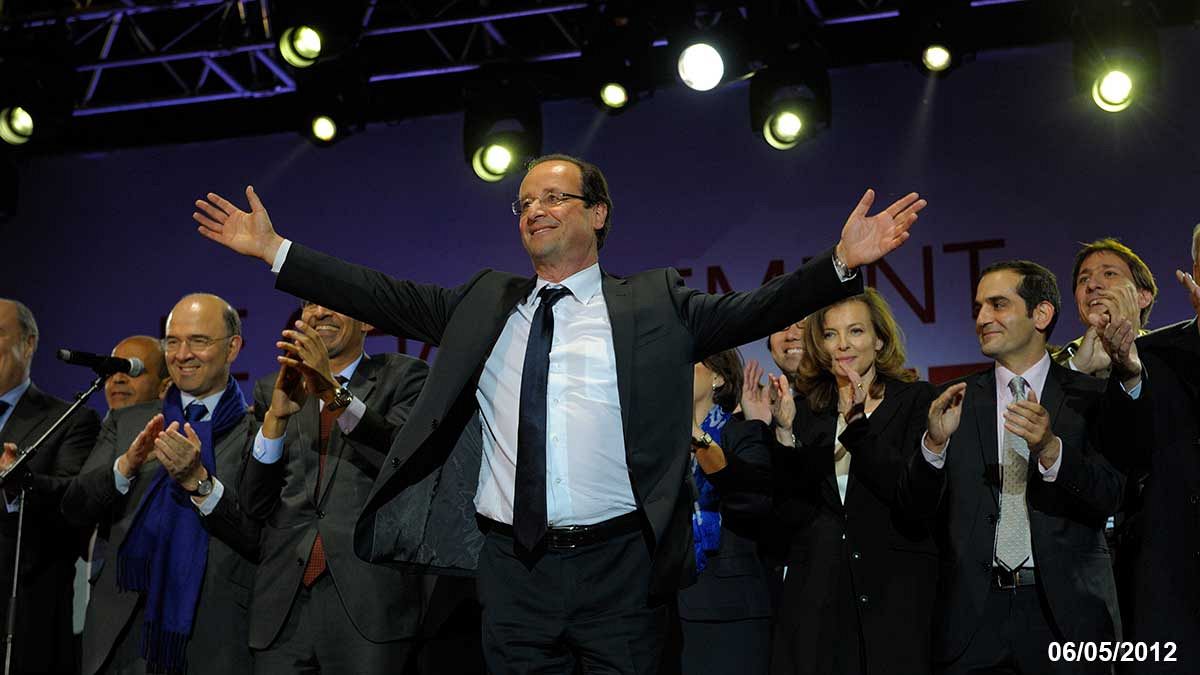François Hollande one year ago was inaugurated in the rain. Many people then took the weather as an omen for the French president. In the months that followed, many felt their doubts came true.
Finally, the Socialists were back in the presidential palace – after 17 years of conservative occupation. The slogan pumping out at the celebration in Place de la Bastille was ‘Now’s the time for change’.
Analyst Frederic Dabi, deputy director at the Ifop polling institute, said the slogan has acquired a bitter edge: “When the French heard ‘Now’s the time for change’, they hoped for a change in their daily lives, about micro-economic questions and social questions and that’s where they feel it’s going wrong.”
A year after that hopeful investiture, things are worse. Unemployment beat a 1997 record, and Hollande hasn’t pulled France out of its slump. He didn’t have a post-electoral honeymoon with the French; three quarters of them today say he has disappointed them.
The car and truck industry suffered worse than other sectors. Some protests boiled over into destruction or violence, like this spring at tyre-maker Goodyear.
The government held steady to its plan of action. Hollande kept calm and hammered home his determination to keep his 60 campaign promises. Among those which have been accomplished are measures for personal savings accounts, small and medium-sized companies, jobs and family policy.
Many of these commitments went relatively unnoticed, but not measure 31: gay marriage. This split opinion, notably for a provision to allow same sex couples to adopt children. The left hailed it as a victory for the whole of society. Others revolted.
The Cahuzac scandal was the administration’s first major emergency – the minister in charge of cracking down on tax evasion who lied about a bank account in Switzerland where his cash went untaxed. It punctured Hollande’s ambition to have his government set a fine moral example for the Republic.
His image came off best abroad. In Europe, he spoke out for growth before austerity in the face of German insistence. Other voices rallied to his side. Then he sent French forces to intervene in Mali, to stop islamist militants from seizing control. Visiting in person, he was warmly greeted, while at home even the war president’s detractors kept quiet – on this move at least.
Laurent Joffrin, editor at French weekly Nouvel Observateur and former news chief with the newspaper Libération, is one of France’s top political analysts. We asked him about François Hollande’s first year as president.
Giovanni Magi, euronews: “You’ve said he won the election through his calculating, chess player cool, but that that became a handicap. Why is that?”
Laurent Joffrin: “Because we are in a storm. And in a storm you should react in an extremely energetic way. Hollande is applying a reasonable social-democratic policy. He has a reform programme, he is implementing one reform after another, and when he speaks publicly he tends to de-dramatise things.
“So people say to themselves, ‘he doesn’t understand how dramatically bad things are!’ I think this is one of the main reasons why he is unpopular. He’s not doing anything shocking, but he gives the impression of someone in power who doesn’t get it. As a result, he is attacked, unjustly – because his policy is not so bad. It’s the way he’s communicating it, in a low profile kind of way.”
euronews: “Could the government bounce back, or could Hollande regain popularity by re-shuffling the cabinet?”
Joffrin: “In my opinion, the current team is too big. There are lots of ministers who nobody knows. Their absence would not be missed. He needs a tighter team, with stronger personalities, with the same prime minister. It is difficult to change the prime minister after just one year, for that person to stay on for another four years. You can’t change him every year. But the French team must be tighter. Second point: some structural reforms have to be launched now, even if it takes some time before their effects are felt. I think it’s fair to say that France has decided to make difficult and much-needed reforms – national reforms, for example, and pension reforms – in exchange for slightly loosening the chains of austerity.”
euronews: “You’ve written a lot about ‘champagne socialism’ (‘la gauche caviar’); do you think the Cahuzac scandal will become important?”
Joffrin: “Yes, it is going to count, because the so-called caviar left are people who are honest, they are rich, they are of the political left, so they bring their financial power to the establishment and then settle into it. Part of the establishment want to help the underdog. That’s the caviar left. It drifted over the past few years, under the influence of the financial economy, speculation and corruption. Cahuzac is an example, since he was entrusted with applying a crackdown and yet had a Swiss bank account and defrauded the taxman.”
euronews: “Some polls say that if an election were held today, Hollande wouldn’t make it to the second round. Do you imagine a 2017 scenario with Nicolas Sarkozy and Marine Le Pen in the second round?”
Joffrin: “It is not impossible – if things don’t improve, if unemployment keeps rising, if social conditions stay as bad as they are. That is four years away, so conjecture like that is somewhat fictional. But parties that are against the system are gaining ground everywhere in Europe. The only thing that can prevent that from happening, apart from an economic recovery, is that all the allies of the left rally around a single candidate to avoid a disaster like the one that happened to Jospin in 2002.”


